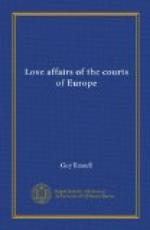But although no man ever deposed the shepherd from the first place in Elizabeth’s favour, it must not be imagined that he was her only lover. The daughter of the hot-blooded Peter and the lusty scullery wench had always as great a passion for men as the second Catherine, who had almost as many favourites in her boudoir as gowns in her wardrobes. She had her lovers before she was emancipated from the schoolroom; and not the least favoured of them, it is said, was her own nephew, Peter the Second, whom she would no doubt have married if it had been possible.
She turned her back on one great alliance after another, preferring her freedom to a wedding-ring that brought no love with it; and she found her pleasure alike among the gentlemen of the Court and among her own servants. In the long list of her favourites we find a General succeeded by a Sergeant; Boutourlin, the handsome courtier, giving place to Lialin, the sailor; and Count Shouvalov retiring in favour of Voytshinsky, the coachman. Thus one liaison succeeded another from girlhood to middle-age—indeed long after she had passed the altar. But through all these varying attachments her heart remained constant to her shepherd-lover, to whom she was ever the devoted wife, and, when he was ill, the tenderest of nurses. To please him, she even accompanied him on a visit to his native village, smiling graciously on his humble friends of other days, and partaking of the hospitality of the poorest cottagers; while on all who had befriended him in the days of his obscurity she lavished her favours.
Of one man who had been thus kind she made a General on the spot; the friendly priest was given a highly paid post at Court; high rank in the army was given to many of his humble relatives; and a husband was found for a favourite niece in Count Ryoumin, the Chancellor’s son.
As for Alexis himself, nothing was too good for him. Although he had probably never handled a gun in his life she made him Field-Marshal and head of her army; and, at her request, Charles VII. dubbed him Count of the Holy Roman Empire, a distinction which Gregory Orloff in later years prized more than all the honours Catherine II. showered on him; while the estates of which she made him lord were a small kingdom in themselves. Alexis, the shepherd’s son, was now, beyond any question, the most powerful man in Russia. If he would, he might easily have taken the sceptre from the yielding hands of the Empress and played the autocrat, as Patiomkin played it under similar circumstances in later years. But Alexis cared as little for power as for rank and wealth. He smiled at his honours. “Fancy,” he said, with his hearty laugh, “a peasant’s son, a Count; and a man who ought to be tending sheep, a Field-Marshal!”
When courtly genealogists spread before him an elaborate family-tree, proving that he sprang from the princely stock of Bogdan, with many a Grand Duke of Lithuania among his lineal ancestors, he laughed loud and long at them for their pains. “Don’t be so ridiculous,” he said. “You know as well as I that my parents were simple peasants, honest enough, but people of the soil and nothing else. If I am Count and Field-Marshal and Viceroy, I owe it all to the good heart of your Empress and mine, whose humble servant I am. Take it away, and let me hear no more of such foolery.”




